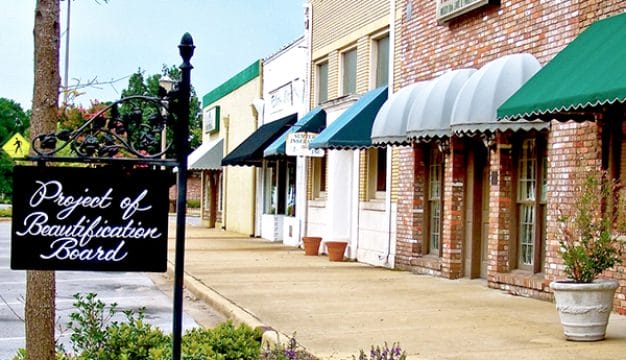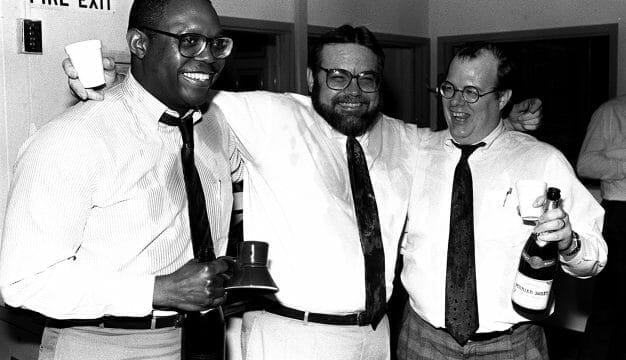Robert "Bob" Riley (2003-11)
Bob Riley (1944- ) served as Alabama’s 52nd elected governor. His administration was marked by efforts to reform the state’s tax system and improving the state’s educational efforts. He has also been a major force in bringing new industry to the state.
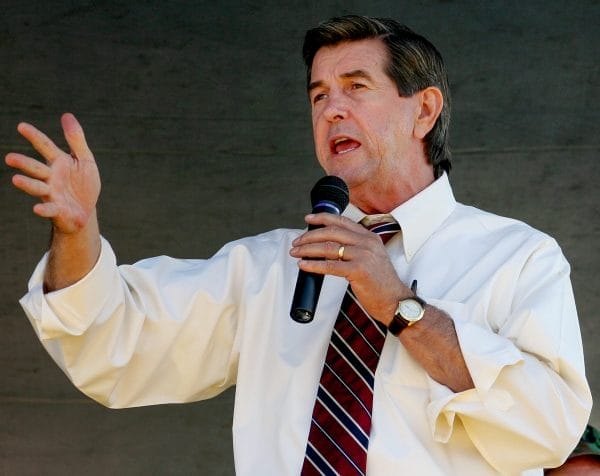 Bob Riley, 2003
Robert “Bob” Renfroe Riley was born on October 3, 1944, in Ashland, Clay County, to Eustace and Elizabeth Riley, joining a family that for generations had farmed and raised cattle in the small community. Riley attended public schools and graduated from Clay County High School in 1962. His family attended First Baptist Church of Ashland, where Riley later served as Sunday School teacher, deacon, and trustee. Riley completed a bachelor’s degree in business administration at the University of Alabama in 1965 and returned to Ashland, where he established several successful businesses that included a trucking company, a car dealership, a drug store, and a poultry operation. He and his high school sweetheart, Patsy Adams, married in 1964, and the couple had one son, Rob, and three daughters, Minda, Krisalyn, and Jenice.
Bob Riley, 2003
Robert “Bob” Renfroe Riley was born on October 3, 1944, in Ashland, Clay County, to Eustace and Elizabeth Riley, joining a family that for generations had farmed and raised cattle in the small community. Riley attended public schools and graduated from Clay County High School in 1962. His family attended First Baptist Church of Ashland, where Riley later served as Sunday School teacher, deacon, and trustee. Riley completed a bachelor’s degree in business administration at the University of Alabama in 1965 and returned to Ashland, where he established several successful businesses that included a trucking company, a car dealership, a drug store, and a poultry operation. He and his high school sweetheart, Patsy Adams, married in 1964, and the couple had one son, Rob, and three daughters, Minda, Krisalyn, and Jenice.
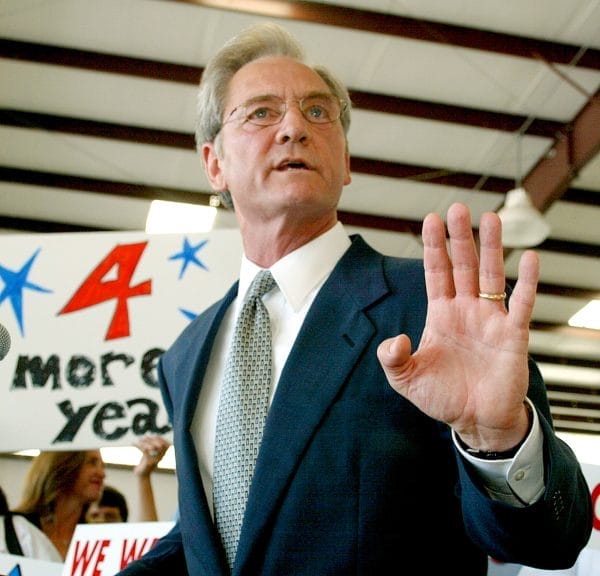 Don Siegelman, 1999
In 1972, Riley won a seat on the Ashland city council, serving until 1976, when he made an unsuccessful bid for mayor of Ashland. Riley was not overtly involved in politics again until 1996, when he ran as a Republican for Alabama‘s Third Congressional District and won that and two additional terms. Riley served as vice chairman of the House Armed Services Subcommittee on Military Readiness and joined conservative Republican efforts to eliminate the marriage tax penalty and to abolish the estate tax. In 2001, as a proponent of term limits, Riley announced his decision to leave Congress at the end of his third term. In August 2001, prior to the end of his tenure in the House of Representatives and during the early months of his participation in the Alabama governor’s race, Riley’s daughter Jenice died of cancer. After deliberation with his family, Riley chose to continue his campaign and, in 2002, defeated Lt. Gov. Steve Windom and former governor Fob James‘s son, Tim, in the Republican primary. In the November general election, Riley faced Democratic incumbent governor Don Siegelman. The results were extremely close, with Riley having less than a percentage point more than Siegelman, whose term was troubled with charges of corruption against a number of his political appointees. In a scenario reminiscent of the 2000 presidential election between Al Gore and George W. Bush, both candidates claimed victory until a recount of ballots from a malfunctioning voting machine in Baldwin County gave Riley the necessary margin of victory. Bob Riley became the state’s 55th governor and the third Republican governor in the modern era.
Don Siegelman, 1999
In 1972, Riley won a seat on the Ashland city council, serving until 1976, when he made an unsuccessful bid for mayor of Ashland. Riley was not overtly involved in politics again until 1996, when he ran as a Republican for Alabama‘s Third Congressional District and won that and two additional terms. Riley served as vice chairman of the House Armed Services Subcommittee on Military Readiness and joined conservative Republican efforts to eliminate the marriage tax penalty and to abolish the estate tax. In 2001, as a proponent of term limits, Riley announced his decision to leave Congress at the end of his third term. In August 2001, prior to the end of his tenure in the House of Representatives and during the early months of his participation in the Alabama governor’s race, Riley’s daughter Jenice died of cancer. After deliberation with his family, Riley chose to continue his campaign and, in 2002, defeated Lt. Gov. Steve Windom and former governor Fob James‘s son, Tim, in the Republican primary. In the November general election, Riley faced Democratic incumbent governor Don Siegelman. The results were extremely close, with Riley having less than a percentage point more than Siegelman, whose term was troubled with charges of corruption against a number of his political appointees. In a scenario reminiscent of the 2000 presidential election between Al Gore and George W. Bush, both candidates claimed victory until a recount of ballots from a malfunctioning voting machine in Baldwin County gave Riley the necessary margin of victory. Bob Riley became the state’s 55th governor and the third Republican governor in the modern era.
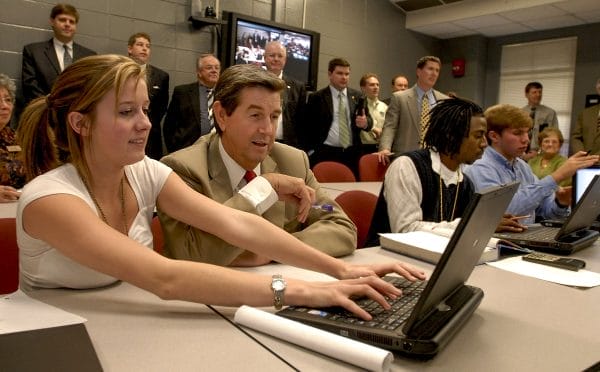 Bob Riley in Prattville
Riley began as governor by eliminating $40 million in special interest, or pork-barrel, projects passed earlier by the state legislature. He then convinced the legislature to pass Amendment One, a densely packed and complicated tax proposal that had the support of the business and academic communities and most of the state’s large newspapers. Now up for public approval, Amendment One was promoted by its supporters on religious and moral grounds because it lessened the tax burden on the state’s poorest citizens. Its detractors argued that the income and property tax increases were a ploy to give government increased opportunities to waste more of the public’s money. In September 2003, 68 percent of those who voted defeated the Amendment One proposal, reminding many of Governor Siegelman’s unsuccessful lottery amendment contest. Unlike Governor Siegelman, who warned the citizens of the state that he had no Plan B if a state lottery was not put in place, Riley quickly recovered from this early defeat in his first term. Again using arguments based on moral appeals, he convinced the legislature to raise the level of income necessary before a citizen was required to pay state income taxes. Riley created by executive order the Governor’s Education Spending Commission in January 2003, and in July the commission presented him and the state with wide-ranging recommendations for improving accountability and value-received in the way the state’s education tax dollars were spent. The legislature failed to act on most of the proposals, however. Nonetheless, Riley did obtain increased monies for Alabama’s Reading Initiative and funding for the creation of ACCESS (Alabama Connecting Classrooms, Educators and Students Statewide), which provides distance learning to every high school in the state.
Bob Riley in Prattville
Riley began as governor by eliminating $40 million in special interest, or pork-barrel, projects passed earlier by the state legislature. He then convinced the legislature to pass Amendment One, a densely packed and complicated tax proposal that had the support of the business and academic communities and most of the state’s large newspapers. Now up for public approval, Amendment One was promoted by its supporters on religious and moral grounds because it lessened the tax burden on the state’s poorest citizens. Its detractors argued that the income and property tax increases were a ploy to give government increased opportunities to waste more of the public’s money. In September 2003, 68 percent of those who voted defeated the Amendment One proposal, reminding many of Governor Siegelman’s unsuccessful lottery amendment contest. Unlike Governor Siegelman, who warned the citizens of the state that he had no Plan B if a state lottery was not put in place, Riley quickly recovered from this early defeat in his first term. Again using arguments based on moral appeals, he convinced the legislature to raise the level of income necessary before a citizen was required to pay state income taxes. Riley created by executive order the Governor’s Education Spending Commission in January 2003, and in July the commission presented him and the state with wide-ranging recommendations for improving accountability and value-received in the way the state’s education tax dollars were spent. The legislature failed to act on most of the proposals, however. Nonetheless, Riley did obtain increased monies for Alabama’s Reading Initiative and funding for the creation of ACCESS (Alabama Connecting Classrooms, Educators and Students Statewide), which provides distance learning to every high school in the state.
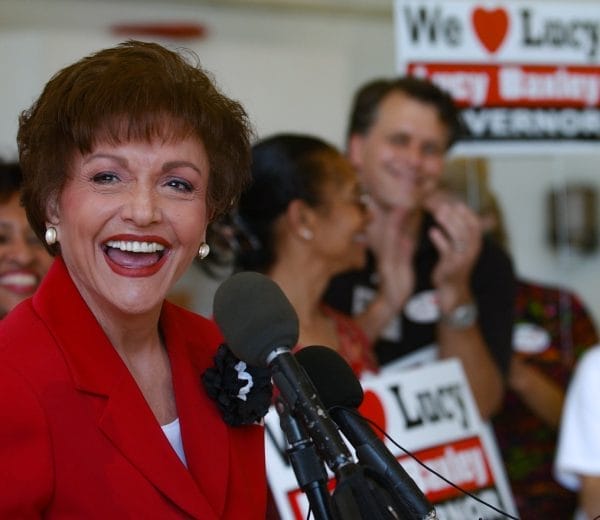 Lucy Baxley
Riley’s popularity faltered within the state’s Republican Party as he faced a reelection campaign in 2006 because of lingering anger from the bitter battle over Amendment One and over his Revenue Department‘s unpopular decision to require annual, rather than quadrennial, reassessment of property, as had been done for decades. Each year as home owners paid higher taxes on their increased property values, they were reminded of this “unRepublican” action by Riley’s administration. Thus the incumbent governor faced a difficult primary contest against the locally popular Roy Moore of Gadsden, a state judge who had achieved national attention for his controversial placement of a large monument consisting of the Ten Commandments and other historical religious sayings in the rotunda of the Alabama Supreme Court building. Enjoying national media attention at the time, Moore refused a court order to remove the display and complained of a lack of support for his actions from Riley. Despite his best efforts, however, Moore could not paint the avowedly Christian Riley as anti-religious. Moore lost the primary race 67 percent to 33 percent. In the November general election, Riley won 58 percent of the vote against Democratic candidate Lucy Baxley, who served as Alabama’s lieutenant governor during Riley’s first term.
Lucy Baxley
Riley’s popularity faltered within the state’s Republican Party as he faced a reelection campaign in 2006 because of lingering anger from the bitter battle over Amendment One and over his Revenue Department‘s unpopular decision to require annual, rather than quadrennial, reassessment of property, as had been done for decades. Each year as home owners paid higher taxes on their increased property values, they were reminded of this “unRepublican” action by Riley’s administration. Thus the incumbent governor faced a difficult primary contest against the locally popular Roy Moore of Gadsden, a state judge who had achieved national attention for his controversial placement of a large monument consisting of the Ten Commandments and other historical religious sayings in the rotunda of the Alabama Supreme Court building. Enjoying national media attention at the time, Moore refused a court order to remove the display and complained of a lack of support for his actions from Riley. Despite his best efforts, however, Moore could not paint the avowedly Christian Riley as anti-religious. Moore lost the primary race 67 percent to 33 percent. In the November general election, Riley won 58 percent of the vote against Democratic candidate Lucy Baxley, who served as Alabama’s lieutenant governor during Riley’s first term.
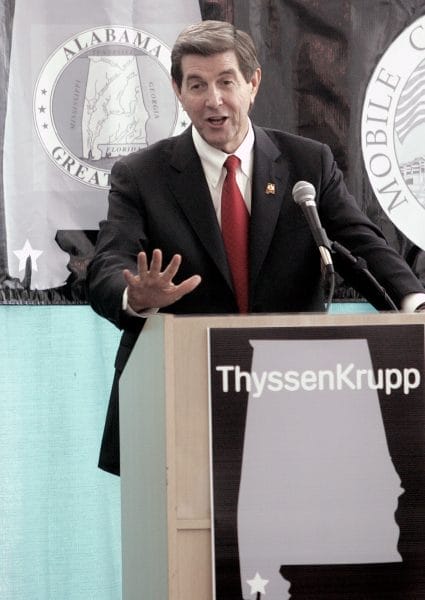 Bob Riley in Mobile
In his second term, Riley took an aggressive stand with the Alabama State Board of Education, especially related to its oversight of the state’s two-year college program. Several members of the board and numerous legislators and their relatives held jobs within the community colleges that they oversaw and for which they designated funding. With rising public outcry over the systemic scandals that were being exposed by investigative journalists from the Birmingham News and other newspapers within the state, Riley called for an end to the employment of state legislators and relatives of members of the board within the community college system. In a deal brokered to gain his testimony about the corruption and conflicts of interest of former associates and legislators, Roy Johnson, chancellor of the two-year colleges, pled guilty to bribery and conspiracy charges related to more than $18 million in government contracts. Riley appointed former Mobile legislator Bradley Byrne as the new chancellor of the two-year college system, and early in 2008 he and Riley put in place a policy designed to prohibit community college employees from serving as state legislators. The Alabama Education Association put its substantial influence into defeating this proposal and promised to challenge it through legal action. In a related effort, Riley regularly requested the state legislature to pass stronger ethics rules. On at least two occasions, the House passed such legislation, only to see it die in the Senate.
Bob Riley in Mobile
In his second term, Riley took an aggressive stand with the Alabama State Board of Education, especially related to its oversight of the state’s two-year college program. Several members of the board and numerous legislators and their relatives held jobs within the community colleges that they oversaw and for which they designated funding. With rising public outcry over the systemic scandals that were being exposed by investigative journalists from the Birmingham News and other newspapers within the state, Riley called for an end to the employment of state legislators and relatives of members of the board within the community college system. In a deal brokered to gain his testimony about the corruption and conflicts of interest of former associates and legislators, Roy Johnson, chancellor of the two-year colleges, pled guilty to bribery and conspiracy charges related to more than $18 million in government contracts. Riley appointed former Mobile legislator Bradley Byrne as the new chancellor of the two-year college system, and early in 2008 he and Riley put in place a policy designed to prohibit community college employees from serving as state legislators. The Alabama Education Association put its substantial influence into defeating this proposal and promised to challenge it through legal action. In a related effort, Riley regularly requested the state legislature to pass stronger ethics rules. On at least two occasions, the House passed such legislation, only to see it die in the Senate.
Riley generally worked effectively with Democrats in the legislature and in offices across the state. He established the Black Belt Action Committee to implement ways for public and private sectors to help this economically depressed area. Democratic congressman Artur Davis (7th district) served as chair of the Health Care Sub-Committee, and other Democrats in the area joined this effort to improve the economic and educational well-being of the perennially impoverished, largely African American section of the state.
Riley appointed Page Walley commissioner of the state’s Department of Human Resources to remedy on-going issues in the state’s welfare and child protection agency. In spring 2003, the 11th Circuit Court of Appeals ended its oversight of the agency, which had been under federal supervision since 1991. Riley boasted that Alabama’s DHR had become a model for the nation in its improved services and protection of the state’s foster children.
 Bob Riley and BP Oil Spill
During Riley’s two terms, Korean carmaker Hyundai completed construction of its plant in Montgomery (the contract was signed during the Siegelman administration) and Japanese carmaker Honda expanded its plant in Lincoln, establishing Alabama as a growing force in the automotive industry. Riley also oversaw negotiations of a contract signed with the German-based ThyssenKrupp (now AM/NS Calvert) steel manufacturing company to construct a $4.2 billion plant located north of Mobile. Under Riley, the state also stands to increase its foothold in the aerospace industry, with the establishment of plants by Northrop Grumman and the European Aeronautic Defence and Space Company. Riley received accolades from the media and most Alabamians for his willingness to support fundamental changes in Alabama’s tax system, and for four successive years Alabama was recognized as “State of the Year” by Southern Business and Development magazine. During Riley’s tenure, Alabama’s unemployment rate fell from 5.3 percent when he took office to modern historical lows into 2008, when the state and nation faced slowing economic growth.
Bob Riley and BP Oil Spill
During Riley’s two terms, Korean carmaker Hyundai completed construction of its plant in Montgomery (the contract was signed during the Siegelman administration) and Japanese carmaker Honda expanded its plant in Lincoln, establishing Alabama as a growing force in the automotive industry. Riley also oversaw negotiations of a contract signed with the German-based ThyssenKrupp (now AM/NS Calvert) steel manufacturing company to construct a $4.2 billion plant located north of Mobile. Under Riley, the state also stands to increase its foothold in the aerospace industry, with the establishment of plants by Northrop Grumman and the European Aeronautic Defence and Space Company. Riley received accolades from the media and most Alabamians for his willingness to support fundamental changes in Alabama’s tax system, and for four successive years Alabama was recognized as “State of the Year” by Southern Business and Development magazine. During Riley’s tenure, Alabama’s unemployment rate fell from 5.3 percent when he took office to modern historical lows into 2008, when the state and nation faced slowing economic growth.
In the 2008 presidential election, Riley threw his support behind John McCain, a Washington, D.C., friend of two decades, and was briefly mentioned as a vice presidential possibility. Riley was limited by the state’s constitution from running for a third term. In April 2012, Riley became a director of Alliantgroup, a tax-consulting firm based in Houston, Texas, and he also works as a lobbyist. He and his wife reside in Birmingham.

